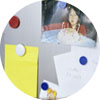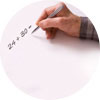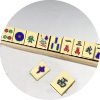10 Warning Signs
Memory loss that disrupts daily life is not a typical part of aging. It may be a symptom of Alzheimer's, a fatal brain disease that causes a slow decline in memory, thinking and reasoning skills. Every individual may experience one or more of these signs in different degrees. If you notice any of them, please see a doctor. Learn how Alzheimer's affects the brain and take the Brain Tour.

|
Memory loss that disrupts daily life
|
 |
 One of the most common signs of Alzheimer's is memory loss, especially forgetting recently learned information. Others include forgetting important dates or events; asking for the same information over and over; relying on memory aids (e.g., reminder notes or electronic devices) or family members for things they used to handle on their own. One of the most common signs of Alzheimer's is memory loss, especially forgetting recently learned information. Others include forgetting important dates or events; asking for the same information over and over; relying on memory aids (e.g., reminder notes or electronic devices) or family members for things they used to handle on their own.
What's a typical age-related change? Sometimes forgetting names or appointments, but remembering them later.
|

|
Challenges in planning or solving problems
|
 |
 Some people may experience changes in their ability to develop and follow a plan or work with numbers. They may have trouble following a familiar recipe or keeping track of monthly bills. They may have difficulty concentrating and take much longer to do things than they did before. Some people may experience changes in their ability to develop and follow a plan or work with numbers. They may have trouble following a familiar recipe or keeping track of monthly bills. They may have difficulty concentrating and take much longer to do things than they did before.
What's a typical age-related change? Making occasional errors when balancing a checkbook.
|

|
Confusion with time or place
|
 |
 People with Alzheimer's can lose track of dates, seasons and the passage of time. They may have trouble understanding something if it is not happening immediately. Sometimes they may forget where they are or how they got there.
People with Alzheimer's can lose track of dates, seasons and the passage of time. They may have trouble understanding something if it is not happening immediately. Sometimes they may forget where they are or how they got there.
What's a typical age-related change? Getting confused about the day of the week but figuring it out later.
|

|
Decreased or poor judgment |
 |
 People with Alzheimer's may experience changes in judgment or decision-making. For example, they may use poor judgment when dealing with money, giving large amounts to telemarketers. They may pay less attention to grooming or keeping themselves clean. People with Alzheimer's may experience changes in judgment or decision-making. For example, they may use poor judgment when dealing with money, giving large amounts to telemarketers. They may pay less attention to grooming or keeping themselves clean.
What's a typical age-related change? Making a bad decision once in a while.
|

|
Withdrawal from work or social activities
|
 |
 A person with Alzheimer's may start to remove themselves from hobbies, social activities, work projects or sports. They may have trouble keeping up with a favorite sports team or remembering how to complete a favorite hobby. They may also avoid being social because of the changes they have experienced. A person with Alzheimer's may start to remove themselves from hobbies, social activities, work projects or sports. They may have trouble keeping up with a favorite sports team or remembering how to complete a favorite hobby. They may also avoid being social because of the changes they have experienced.
What's a typical age-related change? Sometimes feeling weary of work, family and social obligations.
|

|
Changes in mood and personality |
 |
 The mood and personalities of people with Alzheimer's can change. They can become confused, suspicious, depressed, fearful or anxious. They may be easily upset at home, at work, with friends or in places where they are out of their comfort zone. The mood and personalities of people with Alzheimer's can change. They can become confused, suspicious, depressed, fearful or anxious. They may be easily upset at home, at work, with friends or in places where they are out of their comfort zone.
What's a typical age-related change? Developing very specific ways of doing things and becoming irritable when a routine is disrupted.
|
Copyright © 2025 Alzheimer's Association. All rights reserved.
Next: Why Get Checked
干擾日常生活的記憶喪失不是典型的衰老現象。這是阿滋海默症的症狀,這種致命的大腦疾病會導致記憶力,思考和推理技能慢慢下降。每個人都可能經歷其中一個或多個不同程度的症狀。如果您注意到其中任何症狀,請看醫生。請瞭解阿滋海默症如何影響大腦並進行 探索大腦之旅.

|
影響日常生活的記憶力改變 |
 |
 剛獲得的資訊馬上就忘記,是失智症早期最常見的徵兆之一。其他徵兆包括忘記重要的日期或是活動; 重複詢問同樣的事情; 依賴輔助記憶的用品 (例如紙條或是電子用品),或是依賴家人從事以前可以自己做的事。 剛獲得的資訊馬上就忘記,是失智症早期最常見的徵兆之一。其他徵兆包括忘記重要的日期或是活動; 重複詢問同樣的事情; 依賴輔助記憶的用品 (例如紙條或是電子用品),或是依賴家人從事以前可以自己做的事。
什麼是一般隨年紀增長所產生的變化? 偶爾忘記名字或者約會, 但是稍後會想起來。
|

|
計劃事情或解決問題有困難 |
 |
 有些人可能在規劃或是執行計劃上, 或是處理數字上出現困難。 他們可能在依照一個熟悉的食譜做菜或是處理每個月的帳單上出現問題。 他們可能無法專心, 或是需要更多的時間來處理以前熟悉的事情。 有些人可能在規劃或是執行計劃上, 或是處理數字上出現困難。 他們可能在依照一個熟悉的食譜做菜或是處理每個月的帳單上出現問題。 他們可能無法專心, 或是需要更多的時間來處理以前熟悉的事情。
什麼是一般隨年紀增長所產生的變化? 在支票的收支平衡上偶爾出現困難。
|

|
對時間或地點感到困惑 |
 |
 阿滋海默症患者會忘記日期, 季節和時間的關聯性。如果一件事情不是當下發生,他們可能很難理解。有時候他們可能忘記自己在哪或是他們是如何到這個地方的。 阿滋海默症患者會忘記日期, 季節和時間的關聯性。如果一件事情不是當下發生,他們可能很難理解。有時候他們可能忘記自己在哪或是他們是如何到這個地方的。
什麼是一般隨年紀增長所產生的變化?不記得今天是星期幾,但是之後會想起來。
|

|
判斷力變差或減弱 |
 |
 阿滋海默症患者可能會經歷到判斷力或是做決定的能力減弱的改變。例如,他們可能失去對金錢價值的判斷力,而支付大筆錢給打電話來的推銷商。他們可能減少注意力在梳洗或是保持身體清潔上。 阿滋海默症患者可能會經歷到判斷力或是做決定的能力減弱的改變。例如,他們可能失去對金錢價值的判斷力,而支付大筆錢給打電話來的推銷商。他們可能減少注意力在梳洗或是保持身體清潔上。
什麼是一般隨年紀增長所產生的變化?偶爾做出錯誤的決定。
|

|
退出工作或是社交活動 |
 |
 阿滋海默症患者可能開始不再保有嗜好,退出社交活動,或是從工作,體育活動上將自己隔絕。他們可能在追蹤最喜愛的球隊或是完成自己最喜歡的嗜好上出現困難。他們也可能因為自己經歷到的改變而避免參與社交場合。 阿滋海默症患者可能開始不再保有嗜好,退出社交活動,或是從工作,體育活動上將自己隔絕。他們可能在追蹤最喜愛的球隊或是完成自己最喜歡的嗜好上出現困難。他們也可能因為自己經歷到的改變而避免參與社交場合。
什麼是一般隨年紀增長所產生的變化?有時候對工作,家庭,和社交上的義務感到厭倦。
|

|
情緒和個性的改變 |
 |
 阿滋海默症患者的情緒和個性會改變。他們會變得困惑,懷疑,憂鬱,害怕,或是焦慮。只要離開他們自己認定的 "舒適圈"以外,可能在家裡,工作場合,或是和朋友在一起時,他們都容易變得心煩意亂。 阿滋海默症患者的情緒和個性會改變。他們會變得困惑,懷疑,憂鬱,害怕,或是焦慮。只要離開他們自己認定的 "舒適圈"以外,可能在家裡,工作場合,或是和朋友在一起時,他們都容易變得心煩意亂。
什麼是一般隨年紀增長所產生的變化?發展出特定的方法來做事情,規律如果被破壞會容易發怒。
|
© 2025 Alzheimer's Association. 保留所有權利
下一頁:為什麼接受檢查
|